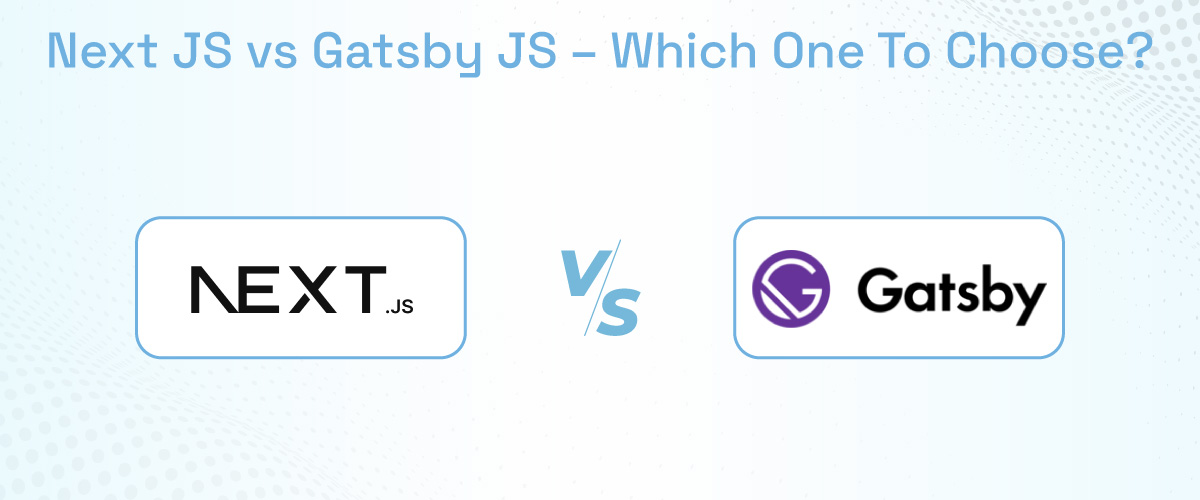
Table of Contents
ToggleA] Introduction
If you plan to create a fast and modern website, selecting the top website development framework is extremely critical. Two trending ones in this regard are Next.js and Gatsby.js. Though both are developed on React, they are still very different from each other. Knowing the difference between Next.js and Gatsby.js can assist you in making the correct decision.
If you need assistance, you can hire developers specialising in website development to start your project promptly and professionally.
B] What is Next.js?
Next.js is a popular React-based framework developed by Vercel. It is known for its server-side rendering, static site generation, and support for APIs. It is an excellent option for SEO-optimised websites and web applications. Companies that require high performance usually opt for Next.js development services. Such services enable you to develop scalable and speedy websites.
Most developers use Next.js development services because they provide complete routing control, data fetching, and performance optimisation.
C] What is Gatsby.js?
Gatsby.js is also a React-based platform. It emphasises more on static site generation. Gatsby is ideal for websites that don’t require frequent content updates. Gatsby takes content from various sources, such as CMSs, APIs, and databases, during build time.
Gatsby’s websites are lightning-fast and simple to host. If your project is of a similar type, you can employ Gatsby’s developers, who are experts in building static websites that are fast, secure, and scalable.
D] Pros and Cons of Next.js and Gatsby.js
Here is a table that gives you a quick look at the pros and cons of Next.js and Gatsby, helping you decide what fits your project best.
Framework | Pros | Cons |
Next.js |
|
|
Gatsby.js |
|
|
Need help choosing between Next JS and Gatsby JS?
E] Static Site Generation in Next.js vs Gatsby
As for static site generation in Next.js vs. Gatsby, both do a fine job. Gatsby is more focused on static generation. It pulls data during build time and creates HTML files. This results in the site being fast but taking more time to build.
Next.js allows you more freedom. You can use static generation where necessary and server-side rendering for dynamic ones. This ability to mix it up makes Next.js a better fit for hybrid use cases.
If you are comparing Next.js with Gatsby, then understand how both of them deal with static content. How they do this can influence your website’s speed and build time.
F] Next.js vs Gatsby Performance Comparison
When we talk about Next.js vs Gatsby in terms of performance, they both excel, but under different circumstances.
Gatsby is best suited for small to medium sites that don’t frequently update content. It pre-bundles the entire site during deployment, so the end pages load extremely fast. This is great for blogs, portfolios, or company websites with largely static content.
Next.js, however, is more suitable for big or dynamic sites. It supports both static and server-side rendering, which means pages can load or update quicker without rebuilding the entire site every time.
That’s why developers compare Next.js vs React, because Next.js builds on top of React and adds better performance tools.
So, in Next.js vs. Gatsby, the winner is neither, and both are at the same time. Use Gatsby for simple, content-focused sites. Use Next.js when your site requires excellent performance, extra flexibility, or the ability to scale with increasing content.
G] Next.js vs Gatsby for Different Use Cases
Let’s have a look at Next.js vs Gatsby for different use cases:
- Gatsby is a good choice for blogs and JAMstack websites. It works well for static content and has useful plugins to make development easier.
- Next.js is better for e-commerce sites. It can handle dynamic content and live updates and has stronger SEO support.
- Next.js is often preferred for enterprise applications because it offers better performance, security, and scalability.
In short, Gatsby is great for static sites, while Next.js is ideal for dynamic and complex projects. Choose based on the needs of your website or business.
H] When to Use Next.js vs Gatsby?
Understanding the difference between Next.js and Gatsby helps you pick the right tool. Here is a table to help you decide when to use which tool:
Next.js | Gatsby.js |
|
|
I] Which is Better, Next.js or Gatsby?
Now let us talk about the big question: which is better, Next.js or Gatsby?
Well, this depends mainly on your needs. If your project needs high performance, dynamic data, and flexibility, Next.js is a better fit. But on the other hand, if your site is mostly static and you want faster builds and easier plugins, go with Gatsby.
So, the better option depends on your project. The Next.js vs. Gatsby debate doesn’t have one winner. It’s all about choosing the right tool for the right job.
J] Conclusion
Deciding between Next.js and Gatsby mainly depends on what type of website you’re developing. Both are excellent tools for building fast, modern, and feature-rich websites. If your website has to deal with dynamic content or scale over time, Next.js may be a better choice. But if you’re developing something more static, such as a blog or portfolio, Gatsby can be an ideal choice.
Consulting the experts is always a good idea if you are unsure where to begin. Depending on what suits you best, you can look into Gatsby.js development services or Next.js services. Contact us today and let our experts assist you in planning and developing your website according to your needs. We are a trusted software development company in India.